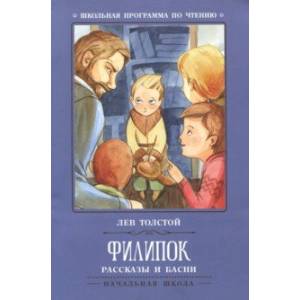Filius. Stories and fables
Please sign in so that we can notify you about a reply
Lev Nikolaevich Tolstoy (1828-1910) - Russian writer and philosopher, author of the well -known world of works ("War and Peace", "Anna Karenina", "Resurrection") Born in Yasnaya Polyana in a rich aristocratic family. L.N. Tolstoy is orphaned early. In 1837, he moved with his sister and three brothers to Moscow, where a distant relative of Ta was engaged in their upbringing. Ergol.
In 1851 he entered military service in the Caucasus and continued to write. In 1852, he sent the manuscript of "Childhood" to a popular magazine, a contemporary "then. Editor of the magazine N.A. Nekrasov praised the work of the young author. After the end of the Crimean War, he left for St. Petersburg and immediately entered the circle of Contemporary, where he was met as the “great hope of Russian literature”.
In addition to literary activity, L.N. Tolstoy considered the issues of education and education important. He created the "alphabet" (published in 1872), which, in addition to the primer, included fairy tales, stories and fables.
Stories described by L.N. Thick, easily perceived, they are written in a simple and understandable language, and at the same time they are instructive, affect the soul, find a response in the hearts of readers. Some of the author’s fables are an adapted translation of the works of the famous ancient Greek fabulist Aesop, but L.N. Tolstoy made them more familiar to modern perception. For example, in the fable of "Man and Water", instead of the Greek god Hermes, we will see the water, but the plot and moral of the Aesop fable are preserved. "It is necessary that everything is beautiful, brief and, most importantly, clear" - this is the most important requirement that the writer made to his work, and always followed him.
For primary school age.
2nd edition
In 1851 he entered military service in the Caucasus and continued to write. In 1852, he sent the manuscript of "Childhood" to a popular magazine, a contemporary "then. Editor of the magazine N.A. Nekrasov praised the work of the young author. After the end of the Crimean War, he left for St. Petersburg and immediately entered the circle of Contemporary, where he was met as the “great hope of Russian literature”.
In addition to literary activity, L.N. Tolstoy considered the issues of education and education important. He created the "alphabet" (published in 1872), which, in addition to the primer, included fairy tales, stories and fables.
Stories described by L.N. Thick, easily perceived, they are written in a simple and understandable language, and at the same time they are instructive, affect the soul, find a response in the hearts of readers. Some of the author’s fables are an adapted translation of the works of the famous ancient Greek fabulist Aesop, but L.N. Tolstoy made them more familiar to modern perception. For example, in the fable of "Man and Water", instead of the Greek god Hermes, we will see the water, but the plot and moral of the Aesop fable are preserved. "It is necessary that everything is beautiful, brief and, most importantly, clear" - this is the most important requirement that the writer made to his work, and always followed him.
For primary school age.
2nd edition
Author:
Author:Tolstoy Lev Nikolaevich
Cover:
Cover:Soft
Category:
- Category:Children's Book
Series:
Series: School for reading
ISBN:
ISBN:978-5-22-31559-0
No reviews found
